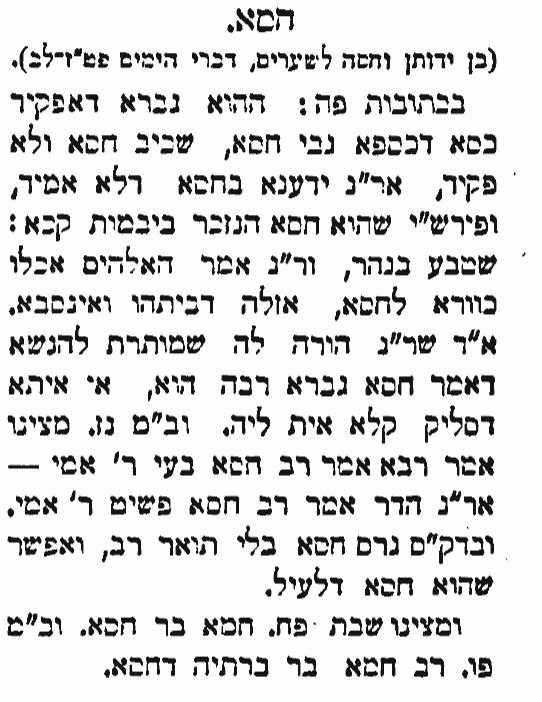Rav Lettuce
In today’s daf (Bava Metzia 57a), Rava cites Rav Chasa, who cites R’ Ami. Thus:
אָמַר רָבָא: אָמַר רַב חַסָּא, בָּעֵי רַבִּי אַמֵּי: אוֹנָאָה אֵין לָהֶם, בִּיטּוּל מִקָּח יֵשׁ לָהֶם אוֹ אֵין לָהֶן? אָמַר רַב נַחְמָן: הֲדַר אָמַר רַב חַסָּא, פָּשֵׁיט רַבִּי אַמֵּי: אוֹנָאָה אֵין לָהֶם, בִּיטּוּל מִקָּח יֵשׁ לָהֶם. רַבִּי יוֹנָה אָמַר אַהֶקְדֵּשׁוֹת, רַבִּי יִרְמְיָה אָמַר אַקַּרְקָעוֹת, וְתַרְוַיְיהוּ מִשְּׁמֵיהּ דְּרַבִּי יוֹחָנָן אָמְרוּ: אוֹנָאָה אֵין לָהֶם, בִּיטּוּל מִקָּח יֵשׁ לָהֶן.
§ Rava said that Rav Ḥasa said that Rabbi Ami raises a dilemma with regard to those matters that are not subject to the halakhot of exploitation: Is the halakha that they are not subject to exploitation where the disparity in the price is one-sixth, but they are subject to nullification of the transaction when it is greater than that? Or, perhaps they are not subject to nullification of the transaction either. Rav Naḥman said: Rav Ḥasa then said that Rabbi Ami resolved this dilemma and said: They are not subject to exploitation; they are subject to nullification of the transaction. Rabbi Yona said: This ruling applies to consecrated property. Rabbi Yirmeya said: It applies to land. And both of them said it in the name of Rabbi Yoḥanan: They are not subject to exploitation; they are subject to nullification of the transaction.
Chasa presumably means Mercy, a positive attribute. Compare Rav Chisda, for Kindness, or Rav Rechumi, among others. Chasa also means lettuce, as in the type of vegetable, chazeret, that many use for maror. (Thus, the Pesach tie-in.)
But, I assume he was named after the positive attribute. Looking at manuscripts of this sugya, we see two variations on the name.
Rav Chisda, the more common, and thus expected, name. Also, it makes some sense for Rava to quote Rav Chisda, who plays the role of both teacher and father-in-law. Also, a bit later in the gemara, a dispute is said to hinge upon whether they agree with Rav Chisda’s (separate) principle. This expected reading is therefore inferior to “Rav Chasa”.
Just plain Chasa, in Vatican 115a. We find a plain Chasa elsewhere, who can interact with these figures (Rava, Rav Nachman). A scribe would more likely add a title, to honor a Sage, than to remove it. Therefore, plain Chasa is a preferred reading.
To demonstrate these readings, Florence 8 - 9 and Munich 95 gave Chisda, though Munich has Chisda consistently, both in Rava’s citation and Rav Nachman’s discussion (though they omit Rav Nachman). Florence only has Chisda in the first instance.
Vatican 117 has Rav Chisda throughout, but it is very messy in terms of establishing its text. Thus:
There are a bunch with Rav Chasa. These are the printings (Vilna and Venice), plus certain manuscripts (Hamburg 165, Escorial, mostly Vatican 115a, partly Florence as above).
Particularly, I’d draw attention to Vatican 115a, which reads:
Thus, Chasa in the first place, and the more honorable Rav Chasa in the second.
Here is what Hamichlol and Rav Aharon Hyman has to say about Chasa the Sage.
Thus, Chasa is an established person. And some people try to connect Rav Chasa in our gemara with that Chasa. I’d add, we have a manuscript that indeed has plain Chasa.
Here is the discussion of a plain Chasa in Yevamot 121b, which somewhat connects him to Rav Nachman.
הָהוּא דַּהֲוָה קָאָמַר וְאָזֵיל: ״מַאן אִיכָּא בֵּי חָסָא, טְבַע חָסָא״. אָמַר רַב נַחְמָן: הָאֱלֹקִים! אֲכַלוּ כְּווֹרֵי לְחָסָא מִדִּיבּוּרֵיהּ דְּרַב נַחְמָן. אֲזַלָא דְּבֵיתְהוּ דְחָסָא וְאִינַּסְבָא, וְלָא אֲמַרוּ לָהּ וְלָא מִידֵּי. אָמַר רַב אָשֵׁי: שְׁמַע מִינַּהּ, הָא דַּאֲמוּר רַבָּנַן מַיִם שֶׁאֵין לָהֶם סוֹף אִשְׁתּוֹ אֲסוּרָה, הָנֵי מִילֵּי לְכַתְּחִלָּה, אֲבָל אִי נָסֵיב — לָא מַפְּקִינַן לַהּ מִינֵּיהּ.
§ There was also a certain gentile who was going around saying: Who is from the house of Ḥasa? Ḥasa has drowned. Rav Naḥman said: By God! The fish have eaten Ḥasa. The Gemara relates: Due to Rav Naḥman’s statement, although he did not issue a court ruling permitting it, Ḥasa’s wife went and married, and no one said anything to her to protest this action. Rav Ashi said: Learn the following from this incident: That which the Sages said, that if a man fell into an endless body of water, his wife is prohibited from remarrying, this applies only ab initio, but if someone married her, we do not take her away from him.
אִיכָּא דְּאָמְרִי, אַנְסְבַהּ רַב נַחְמָן לִדְבֵיתְהוּ, אֲמַר: חָסָא גַּבְרָא רַבָּה אִיתֵיהּ, אִם אִיתָא דִּסְלֵיק — קָלָא אִית לֵיהּ לְמִילְּתָא. וְלָא הִיא: לָא שְׁנָא גַּבְרָא רַבָּה, לָא שְׁנָא לָאו גַּבְרָא רַבָּה — דִּיעֲבַד אִין, לְכַתְּחִלָּה לָא.
There are those who say that Rav Naḥman actually issued a ruling and allowed his wife to marry. He said: Ḥasa is a great man; if it was so that he emerged from the water the incident would have generated publicity. Since nothing was heard from Ḥasa in a long while, it can be assumed that he died. The Gemara comments: That is not so. It is not different if he is a great man and it is not different if he is not a great man. If a woman remarried based on testimony that her husband drowned in an endless body of water, after the fact, yes, she may remain married, but she may not remarry ab initio.








